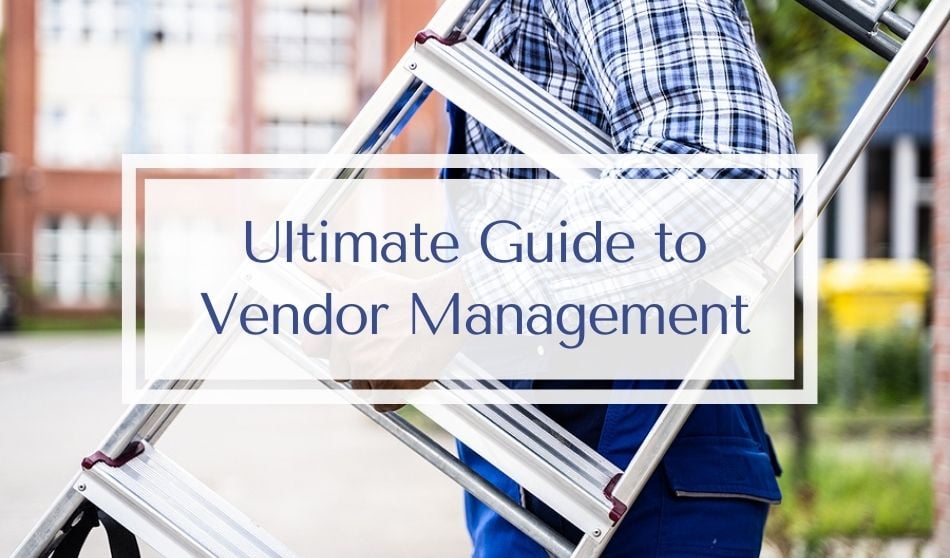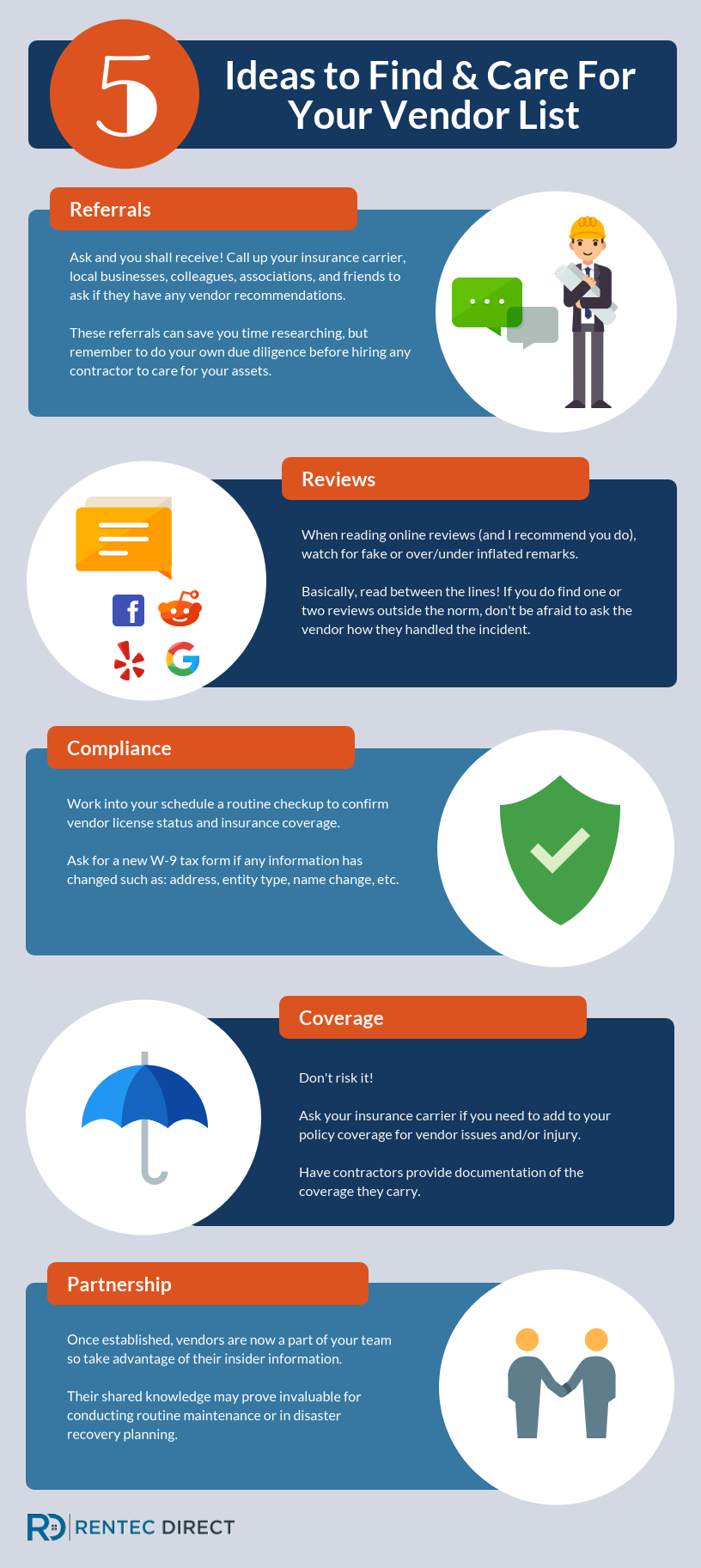
Your vendors and contractors are an extension of you – and a good vendor management system in place can demonstrate your priorities, standards, and business goals. Without one, you may be missing important elements which can drain your time and impact your profit margins and reputation.
What is Vendor Management?
Vendor management (also known as third-party vendor management) is the systematic plans, procedures, and activities (including the tools used to monitor and document those activities) that help you establish and nurture your vendor relationships to leverage the rapport for the mutual benefit of both parties and the end-user.
The Three Pillars of Vendor Management
All vendor management activities are defined in the three pillars of vendor management which are trust, relationship, and assessment. Meaning, it’s important for a landlord or property manager to:
- Build a rapport of trust
- Grow the relationship towards value
- Mitigate risk through assessment
Before we get to the finer details of vendor management, let’s focus on what those pillars mean in your day-to-day rental business activities.
One – Build a rapport of trust
It starts with finding the perfect vendor (see section below); one that your tenants and staff can trust as reliable, capable, and meets your standards.
From there, trust gets established and built by the consistency in which both parties fulfill their obligations such as timely payments on your part, and timely and quality service on theirs.
Writing contracts and agreements help define those standards and responsibilities and will help avoid any misunderstandings.
In most relationships, trust is built between two individuals. In property management, trust building includes the tenant who is either directly involved or directly impacted by your choice.
In addition to the impact and impression left for tenants, property management companies have to take into consideration their clients (the property owners) to build trust between all four parties involved.
Two – Grow the relationship towards value
Bottom line, managing vendors successfully is first and foremost about value. From negotiations to contract renewals, the management process empowers you to take appropriate measures to control costs and set service standards that drive value.
That value isn’t one-sided as most contractors are eager to have repeat reliable business.
Value isn’t the same thing as getting the lowest price point; although cost cutting and discounts are a part of the value equation. Instead, value comes from a successful long-term relationship. It’s about efficiencies, time savings, expert advice, and other variables that can benefit your business. And as result of these relationships, service excellence is enhanced and greater value is unlocked over time.
Three – Mitigate risk through assessment
Risk assessment is paramount for your rental business. It goes beyond the due diligence in pre-qualifying and creating your vendor list. You’ll want to be observant with ongoing evaluations regarding the needs of the property, the needs of the tenants, and the types of issues that could arise to reduce the risks associated with vendors.
From those observations, you’ll have the tools to better be able to negotiate contract renewals, improve service standards, work with your insurance providers, and improve your tenant-landlord relationships.
Finding the Perfect Vendor
Grabbing your phone to search for 24/7 plumbers when you get a call from a tenant that a pipe burst at 2am and relying on the first option isn’t ideal. Just because a vendor is available doesn’t mean they are the right one for the job. Instead, imagine you have an emergency and a comprehensive vendor list at your fingertips with the assurance that you have the best fit for the job. That can become your reality with a little time and attention.
For a comprehensive walk-through on best practices in finding your perfect vendor, check out this helpful resource: The Landlord’s Guide to Screening Vendors

Vendor Relationship Management
After you’ve found the perfect contractors and made your vendor list, it’s time to establish and get to the tasks of managing those relationships. And, it all starts with a good contract or agreement.
Contracts and Agreements
Likely, you won’t need a contract for a one-time service, but if you are going to be calling on a vendor or supplier regularly, you want to get all those details put into a written and signed agreement.
The goal isn’t to negotiate the lowest price, but rather the highest value, and that can come in many forms such as service level agreements, preferential and after-hours support, and expert help in planning and guidance.
Be sure to think about and communicate both in writing and discussion your expectations and standards in regards to quality, timeliness, professionalism, and tenant and client interactions.
Remember to have your attorney get involved with any contracts between you and your vendors. It’s also a good idea to check with your insurance provider to make sure all your bases are covered when it comes to accountability and liability if something should happen to go awry.
Maintenance Requests and Supply Orders
Your landlord software likely allows tenants to send in repair requests from their tenant portal and lets you set a work order priority level and email those work orders to vendors.
But a good system alone doesn’t override those important decisions you have to make. To become a pro at managing those requests, check out this great resource to get you started : How to Prioritize Maintenance Requests
Your suppliers will appreciate you if you give them enough lead time for supply orders. In that, don’t be shy in asking for discounts for bulk and advance purchases.
It might work out in your favor to work with specialty businesses instead of grabbing supplies from home improvement stores.
For example, it’s likely you paint your rentals often during tenant turnover. Instead of running to a home improvement store, consider working with a dedicated paint supply company to get better pricing. You’ll get detailed tracking of purchase orders to better allocate expenses and have experts on hand for all your painting needs. Many times dedicated suppliers will also offer free delivery or shipping which can be a huge savings in both time and vehicle expenses.
The tenant-vendor relationship helps build trust
The vendors you select, their behavior and demeanor, and their quality of work all make a huge impact with your tenants. In building your tenant-vendor relationship, you are building your tenant-landlord relationship.
Share information, priorities, and company culture with your vendors because they act on your behalf and represent you (or at minimum represent your decision making by your choice in hiring them). Remember, the vendors reputation is your reputation.
Ask your contractors to collaborate on strategies to best serve your tenants and clients. As experts in their field, not only can you learn best practices and get help with planning and execution of a project, but your vendors will feel valued and that translates to better overall quality and care.
Vendor Invoices and Payments
Just as you anticipate and count on receiving tenant rent payments, your contractors and suppliers do the same. They rely on timely payments to keep their business running smoothly and delays in honoring those invoices can create a rift in your vendor relationship.
Whether you negotiated payments 30, 60, or 90 days after service or delivery, your vendors will appreciate not having to wait for a check in the mail. Look for vendor ACH payment options in your rental software. Your vendors will love the money showing up in their bank account without needed to go make a deposit and you’ll love the simplicity of paying your invoices with a push of a button.
Review and Evaluations
Think ‘long game’ when working with your vendors. With frequent collaborations and consistant monitoring, you can build a solid mutually beneficial vendor relationship.
Many landlords find sending out a tenant survey for feedback after a service call very helpful and insightful for evaluating a continued vendor relationship.
Whether you are under contract or simply keeping your vendor list current, you will want to periodically requalify your vendors and make sure all their information is up-to-date. Remember to schedule time in your calendar to request copies of current:
- Licenses
- Certifications
- Contact information
- IRS W-9 form (Request for Taxpayer Identification Number and Certification)
In that evaluation, you’ll also want to go over any current contracts, review all tenant feedback, check out online reviews, and check in with your attorney and insurance provider.
In the event that vendor resource is no longer serving the best interests of your business, it’s time to consider ending that relationship and drafting a vendor termination letter.
Even with the best vendor screening, situations can change and it may be time for a breakup. Ending a vendor relationship shouldn’t be done by phone or text. And it certainly shouldn’t be an in-person affair as those can escalate quickly. None-of-the-above are professional and all leave you vulnerable to legal issues. Instead, take the time to draft a vendor contract termination letter with care.
How Property Management Software Builds and Maintains Vendor Relationships
The best property management software will have plenty of tools to make vendor management a breeze. Look for a landlord software that allows you to:
- Create custom forms and contracts
- Use eSignature features to get contracts electronically signed
- Send and receive text messages within the system
- Pay vendors by ACH and printed checks
- Email work orders
- Create and process 1099 tax forms
- Maintain a vendor and payee contact list (address book)
- Upload and save important contracts and documentation
In some cases, you may want to offer a vendor software user access or access to tenant information. If they need tenant information, remember to provide only the information necessary for the work they need to accomplish. If they need software access, be sure to set permissions appropriately.
Key Takeaways
Just like any good relationship, it takes time and attention to develop one with your vendors where all parties mutually benefit. It all comes down to prioritizing relationship building and staying on top of your vendor management tasks.
It’s easy to let the pressures of day-to-day situations get in the way so remember to carve out time specifically for maintaining your vendor list, evaluating services and suppliers, and bringing the best resources to your property, tenant, and rental business needs.





